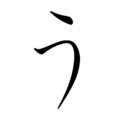う
Japanese
| Stroke order | |||
|---|---|---|---|
Etymology 1
Derived in the Heian period from writing the man'yōgana kanji 宇 in the cursive sōsho style.
Syllable
う (romaji u)
See also
Etymology 2
/mu/ → /ũ/ → /u/ → (fused with the /a/ ending in the preceding verb stem) /ɔː/ → /oː/
From Old Japanese む (mu). See the entry at よう for more information.
Suffix
う (rōmaji -u)
- (jodōshi) Used to make the volitional form of verbs.
- Expressing one's will to do something.
- そろそろ帰ろう。
- Sorosoro kaerō.
- I'll return before long.
- 手伝おうか。
- Tetsudaō ka.
- Shall I help?
- 誕生日ケーキを作ろうと思っています。
- Tanjōbi kēki o tsukurō to omotte imasu.
- I'm thinking about baking a birthday cake.
- 誕生日ケーキを作ろうとしています。
- Tanjōbi kēki o tsukurō to shite imasu.
- I'm trying to bake a birthday cake.
- そろそろ帰ろう。
- Inducing or stimulating other person to do something.
- 明日一緒に学校に行こう。
- Ashita issho ni gakkō ni ikō.
- Let's go to school together tomorrow.
- 明日一緒に学校に行こう。
- (archaic) Presenting a supposition.
- Expressing one's will to do something.
Usage notes
Attaches only to the 未然形 (mizenkei, “irrealis or incomplete form”) of Group I (godan) verbs, with the sound change au → ō.
- 書く (kaku) → 書か (kaka) + う (u) → 書こう (kakō)
- 呼ぶ (yobu) → 呼ば (yoba) + う (u) → 呼ぼう (yobō)
- 言う (iu) → 言わ (iwa) + う (u) → 言おう (iō)
The volitional form of Group II (ichidan) and Group III (irregular) verbs are formed with よう (-yō) instead of う (-u).
In traditional Japanese grammar, this is a 助動詞 (jodōshi, “auxiliary verb”), with the sole form う (u) as the 終止形 (shūshikei, “terminal form”) and the 連体形 (rentaikei, “adnominal form”).
See also
Japanese basic inflections
| Verbs | -i adjectives | nouns and -na adjectives | |||
|---|---|---|---|---|---|
| Nonpast | Plain | Affirmative | Use the dictionary form | stem + い (-i) | noun + だ (da) (noun + である (de aru)) |
| Negative | mizenkei + ない (-nai) | stem + くない (-ku nai) | noun + で(は)ない (de [wa] nai) | ||
| Polite | Affirmative | ren'yōkei + ます (-masu) | stem + いです (-i desu) | noun + です (desu) | |
| Negative | ren'yōkei + ません (-masen) | stem + くないです (-ku nai desu) stem + くありません (-ku arimasen) | noun + で(は)ないです (de [wa] nai desu) noun + で(は)ありません (de [wa] arimasen) | ||
| Past | Plain | Affirmative | ren'yōkei (with onbin sound changes for Group I verbs) + た (-ta) | stem + かった (-katta) | noun + だった (datta) (noun + であった (de atta)) |
| Negative | mizenkei + なかった (-nakatta) | stem + くなかった (-ku nakatta) | noun + で(は)なかった (de [wa] nakatta) | ||
| Polite | Affirmative | ren'yōkei + ました (-mashita) | stem + かったです (-katta desu) | noun + でした (deshita) | |
| Negative | ren'yōkei + ませんでした (-masen deshita) | stem + くなかったです (-ku nakatta desu) stem + くありませんでした (-ku arimasen deshita) | noun + で(は)なかったです (de [wa] nakatta desu) noun + で(は)ありませんでした (de [wa] arimasen deshita) | ||
| Volitional | Plain | mizenkei (of Group I verbs) + う (-u > -o) mizenkei (of other verbs) + よう (-yō) | †stem + かろう (-karō) (stem + いだろう (-i darō)) | noun + だろう (darō) (noun + であろう (de arō)) | |
| Polite | ren'yōkei + ましょう (-mashō) | (stem + いでしょう (-i deshō)) | noun + でしょう (deshō) | ||
| Conjunctive | ren'yōkei (with onbin sound changes for Group I verbs) + て (-te) | stem + くて (-kute) | noun + で (de) (noun + であって (de atte)) | ||
| Hypothetical conditional | kateikei + ば (-ba) | stem + ければ (-kereba) | (noun + であれば (de areba)) | ||
Etymology 3
| For pronunciation and definitions of う – see the following entries. | ||||||||||||||||
| ||||||||||||||||
| (This term, う, is the hiragana spelling of several Sino-Japanese terms.) For a list of all kanji with on'yomi う, not just those used in Sino-Japanese terms, see Category:Japanese kanji with on reading う. |
Etymology 4
This article is issued from
Wiktionary.
The text is licensed under Creative
Commons - Attribution - Sharealike.
Additional terms may apply for the media files.
